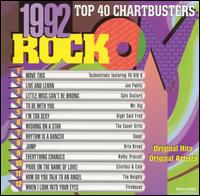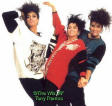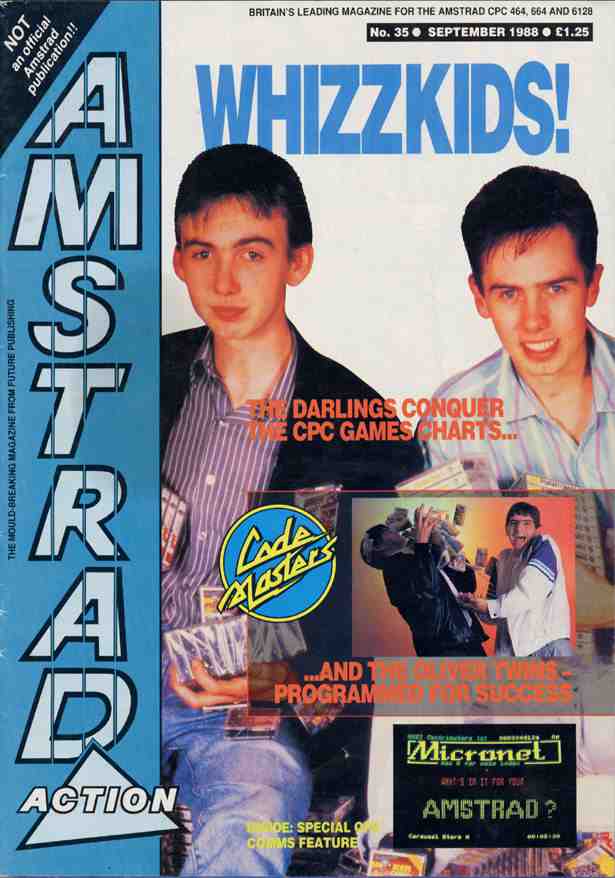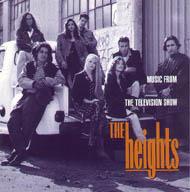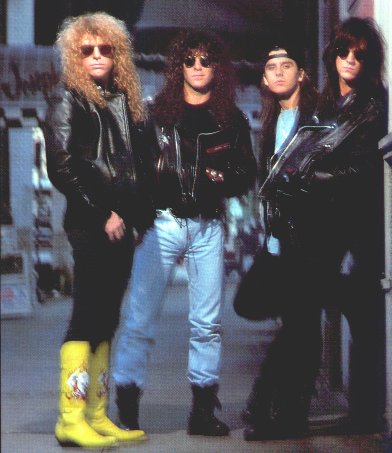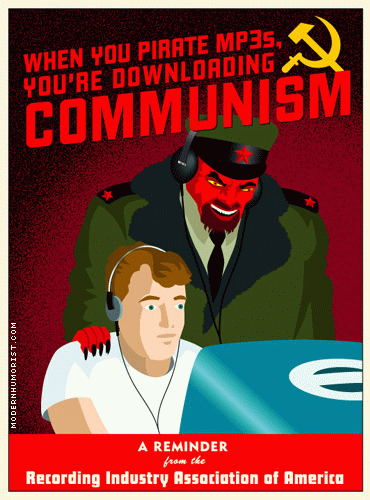Written in 2003 as a full-fledged report for 12th grade English, this essay’s goal was not to express opinion, but to give a broad spectrum of what has actually happened in the events of file sharing. There may be a little bias against the RIAA, however, as dave’s personal opinions against the RIAA can be clearly described in this article: File Sharing and the RIAA Theory. The preceding article was written to actually be used as quotes for THIS essay, but dave decided against using it in the end (teehee). The end report (including Works Cited) was eleven pages long.
————————————
Peer-to-Peer (or P2P) programs allow consumers to locate whatever music they would like, with great ease and provides a tremendous variety of music to choose from. The P2P companies and their users have come under siege by the Recording Industry Association of America (RIAA), which is determined to abolish all file sharing. P2P programs allow users to download files from other users, through the network that the P2P program is using. The RIAA is trying to end the sharing of copyrighted music in this fashion, as well as any and all files by any means possible. They see file sharing programs as the means for transferring, and the users receiving the files as the main copyright infringers.
To gain a full understanding of how the RIAA has begun suing individual users, it is necessary to learn about the history of file sharing. The first file sharing program, Napster was the beginning of the file sharing saga. Before Napster, it was hard to get any MP3s. MP3s were usually found on unreliable web sites that did not have the MP3 files at all, but “the MP3 world was changed when Shawn Fanning, a 19 [year] old dropout from Northwestern, conceived of an idea he called Napster, a program that allowed users to share MP3 files over the Net with other Napster users” (“Stealing or Sharing” 1). Napster offered the ease of use of a search engine, and a variety of music which was unparalleled by any music store. As more and more people began using Napster, more files were shared, and it became easier to find the songs people wanted. However, this new innovation came with consequences, especially for the RIAA. It used to be that “music [was] confined to physical mediums: audio cassette tapes and compact discs” (“Stealing or Sharing” 1), but no longer with the creation of Napster. The RIAA didn’t like that at all, because their product was now out of their controlled distribution. While Napster was enjoying a period of prosperity, heated debate over the topic of free distribution of music was underway. The bottom line was that it had indefinitely changed the way music was sold and what was bought, as the common consumer was now smart enough not to buy five dollar CD singles or an overpriced album with at most one or two good songs on it, out of twenty or even less. Instead, the consumer could just download the one song they liked from Napster. Napster was definitely the way to share music.
The fall of Napster would not only bring down itself, but all others who invested in it, such as Bertelsmann. Bertelsmann is a very large corporation in Europe, which owns companies such as BMG (a music distributor). Bertelsmann helped Napster on numerous occasions when it needed money, and eventually filed bankruptcy because of their investment. In December of 1999, the RIAA began its lawsuit against Napster. The RIAA, trying to hamper Napster from sharing music online, only helped advertise it to the public at large. When the media started covering the RIAA’s lawsuit, the popularity of Napster exploded and Shawn Fanning “was plastered all over magazines, in newspapers, and on TV” (“Stealing or Sharing” 2) for the next year. Even though the RIAA had sued Napster in 1999, an actual ruling did not come until “July 26th, 2000, [when] U.S. District Judge Marilyn Patel ruled in favor of the record industry and ordered Napster to stop allowing copyrighted material to be swapped over its network by midnight two days later” (“Stealing or Sharing” 2). Napster had to place filters on what their users could download, but users found ways around the filters by renaming the files. The RIAA was not satisfied with the filtering that Napster was doing. When time almost ran out “on July 28, 2000, nine hours before Napster would have had to shut down, the Ninth U.S. Circuit Court of Appeals ruled that the company should be allowed to continue operating” (“Stealing or Sharing” 2). Through the RIAA’s eyes, this court ruling would later do even more damage to the RIAA’s business. The RIAA was suffering from the “five percent fall in worldwide music sales during 2001, [that had been] the worst drop-off since the introduction of the CD in 1983” (Menn 310). The RIAA was also concerned over the “sales of blank CDs [which] topped those of recorded CDs” (Menn 310). The drop in profit and the sales of blank CDs suggested to the RIAA that they were losing a lot of money to the piracy explosion, and laid the blame on Napster.
After all the court battles with the RIAA, Napster was eventually shut down for good. On July 11, 2001, “Napster lawyer Steve Cohen told [Judge] Patel that Napster could relaunch the system and weed out 99 percent of the improper songs” (Menn 276), however, Patel would not accept anything less than one hundred percent of all copyrighted material prevented from being downloaded. Steve Cohen was “unable to promise a faultless system” (Menn 276) and Napster remained closed down. This was a huge win for the RIAA, and helped stop the flow of distribution of copyrighted music, as well as file sharing in general. The free version of Napster was gone forever, and Napster had gone into a transition stage to a paid music service. Only recently, in November 2003, Napster finally reopened as a pay service.
Many lessons were learned after Napster had been shutdown. Out of Napster’s demise, a whole new generation of P2P programs was created, including Morpheus, Gnutella, Kazaa, WinMX, and Audiogalaxy. These new P2P programs “had a central design that made it so that the companies didn’t host central lists of files on the P2P network” (“Suing Individuals” 1), which was the major fault in Napster’s case against being shutdown. The reason that Napster failed in the courts was because it had had “supervisory” power over what their users were downloading because they had kept the list of files on a central server. Since the new P2P programs didn’t have a central server with a list of files being shared, they didn’t have the same liability as Napster had. The new P2P programs had succeeded, and “by 2002 those services were almost as easy to use as Napster was, had as many users as Napster did at its peak, and were far harder to shut down” (Menn 309), and the RIAA now had a bigger problem on their hands. Instead of one major P2P program to deal with, they had multiple P2P programs which they almost couldn’t close down at all. The RIAA would not go down without a fight though.
The RIAA decided to take a different approach. Instead of only fighting the new generation of P2P programs in court, they decided to educate the consumer about how it was wrong (and illegal) to download copyrighted material. One tactic they used to educate the public was to try to get sympathy from the public for the RIAA and all the people in the music business. The RIAA constantly said that “illegal file sharing robs songwriters and recording artists of their livelihoods, and also undermines the future of music itself by depriving the industry of the resources it needs to find and develop new talent” (“Begins Suing” 1). The RIAA also claimed that “illegal file sharing threatens the jobs of tens of thousands of less celebrated people in the music industry, from engineers and technicians to warehouse workers and record store clerks” (“Begins Suing” 1). The RIAA has many powerful names under its power, and often have their most famous artists talk about how file sharing is bad. They even went as far as to say that “all the industries are failing because of file sharing, from CD packers to guitar players” (“Begins Suing” 3). The RIAA also promoted the “switching from downloading free music illegally, to a paid service, downloading legally” (“Begins Suing” 1), which was not going over well with the public at large. Some people did make the change over to a paid service, but most stayed with a free service, because they were smart enough to not pay for what they could get for free. Obviously after a few months of preaching for sympathy, the RIAA concluded that getting people to be sorry for rich artists and multi-billion dollar corporations would not work.
The RIAA had to change their tactics, and in May of 2003, the RIAA stopped reaching out for sympathy from the public as a number one priority. Instead, the RIAA took a completely opposite approach, and started to scare everyone with threats of lawsuits. One such example of the RIAA trying to scare people, was when they sent out “more than four million Instant Messages since May [2003] directly to infringers on Kazaa and Grokster” (“Begins Suing” 2) saying that their identities were not anonymous when they illegally offered music. As well as trying to scare people on a personal level, the RIAA has been pushing for “the right to hack into your computer and delete your stolen MP3s” (“Hack Your PC” 1), which raises many privacy issues. The RIAA had also been hinting about suing individuals who shared copyrighted music online. These new tactics seem to work, as “61% of those polled in August admitted they knew sharing copyrighted music was illegal, up from 54 in July, and 37 in early June” (“Begins Suing” 2), looking like the RIAA was accomplishing what it set out to do. The RIAA is also offering “amnesty” to those who “voluntarily pledge to stop distributing music illegally, by wiping their hard drives clean of all illegal music, and promise to never share or download any illegal music again” (“Begins Suing” 1), in exchange for a promise of not being sued. The RIAA has been trying anything it could in recent months to get people to stop what they were doing.
The RIAA has used the Digital Millennium Copyright Act of 1998, or the DMCA, in their pursuit to subpoena individuals. The DMCA was originally “signed into law by President Clinton on October 28, 1998” (“Act of 1998” 1), and contains five different sections, called titles. The title that the RIAA uses to subpoena anyone they want, is Title II, the “Online Copyright Infringement Liability Limitation Act” (“Act of 1998” 1), which creates limitations on the liability of people committing copyright infringement. The DMCA enables the RIAA to go past the courts, and directly subpoena the Internet Service Providers (or ISPs) for the identities of whom they want to sue, which saves the RIAA a lot of time and money. The RIAA does not sue the ISPs themselves for copyright infringement, because the DMCA states that online service providers have limited liability for what their users do while using the service provided by the ISP. If the ISPs do not know that their users are committing copyright infringement, and they are not gaining any money from the copyright infringements, then they are not liable for any damages.
Even though the RIAA has sent subpoenas to certain ISPs to gain the identities of those in question, some ISPs have fought back against the RIAA, to keep their users’ identities secret. One such ISP, Charter Communications Inc., “said it has sued the recording industry to block it from getting names of its customers for alleged song-swapping on the Internet” (“Charter Sues” 1), considering the relationship with their customers their most important responsibility. Not only Charter Communications, but Verizon Communications and SBC Communications have also “gone to court to challenge the industry’s interpretation of the law, which they say violates due-process and free-speech rights and threatens privacy” (“Charter Sues” 1). The ISPs have become an obstacle, even a last line of defense, in the RIAA’s path to gain the identities of file sharers.
The file sharing community was reluctant to believe that the RIAA would sue every single file sharer there was. However, the RIAA followed through on its threats in September 2003, and “filed copyright infringement claims against 261 infringers on Kazaa and Grokster” (“Begins Suing” 2). There have been settlements outside of court, but an actual case is yet to go to trial. In recent weeks there has been a swell in the number of subpoenas the RIAA is issuing, since the “RIAA announced on June 25 that it would… [gather] …evidence in order to bring lawsuits in September against computer users who illegally distribute copyrighted music” (“Begins Suing” 2). There have been so many subpoenas, that the offices filing these subpoenas had to take people from other, more important, cases and dedicate their time to the RIAA’s subpoenas. The RIAA said that they were suing people who distributed “substantial amounts (averaging more than 1,000 copyrighted music files each) of copyrighted music on peer-to-peer networks” (“Begins Suing” 1), hoping to make the P2P experience a more unpleasant one, forcing the people that had the most files off of the networks. Unsuspecting people, like grandparents, were slapped with a subpoena, and were liable to pay $50,000 to $150,000 for each song that infringed copyrights. These unsuspecting people didn’t even know that they had any songs on their computers that infringed copyrights, because relatives used their computers to download them. By the process of elimination, the RIAA can almost force people to switch over to a pay service, because they are not able to find the files they want or they do not want to run the risk of being sued.
There are always two sides to an argument, and the RIAA’s attempts to kill P2P networks have support from some, but not from others. Politically, the government is behind the RIAA, because there is copyright infringement going on. The Copyright Office has not changed the DMCA, despite the petitions and emails from the public. Public opinion is against the most recent course of action the RIAA has taken. Many new websites advocating the boycott of the RIAA have risen up against the RIAA. One such web site is boycottriaa.com, which posts news articles about file sharing, in addition to boycotting the RIAA. Some web sites even have “campaign[s] to make file sharing legal” (“How to Not Get Sued” 1). These web sites also help out the file sharer, by suggesting several ways to avoid being sued by the RIAA, such as disabling “the ‘sharing’ or ‘uploading’ features on [the] P2P application” (“How to Not Get Sued” 1), which will keep a user from being targeted by the RIAA. This method, however, undermines the whole idea of P2P file sharing. The RIAA would get what they wanted if everyone disables their sharing.
The RIAA’s recent actions against the world of file sharing will have a definite effect on the way file sharing will continue in the future. From day one of the file sharing era, the RIAA has been out to stop it. File sharing has many more legal uses than just sharing songs, such as music from unsigned bands, sharing pictures, and other files people want. The RIAA fails to realize this, and they want to shut down all the file sharing networks of the world. The longer the RIAA fights against file sharing, the more people will be inclined to boycott the RIAA, and the RIAA will see more of their profits slide downward than when unrestricted file sharing first began.
——————————————–
Works Cited
“Charter Sues to Block RIAA from Getting Names.” 7 October 2003 <www.reuters.com>
“Digital Millenium Copyright Act of 1998, The. U.S. Copyright Office Summary.” 14 October 2003. <www.loc.gov>
“File Sharing: Stealing or Sharing amongst friends?” 8 October 2003 <www.misbridge.mccombs.utexas.edu>
“How Not To Get Sued By The RIAA For File-Sharing (And Other Ideas to Avoid Being Treated Like a Criminal)” 14 October 2003 <www.eff.org>
Menn, Joseph. All the Rave: The Rise and Fall of Shawn Fanning’s Napster. New York: Crown Business, 2003.
“Recording Industry Begins Suing P2P File Sharers Who Illegally Offer Copyrighted Music Online.” 5 October 2003 <www.riaa.com>
“RIAA Wants to Hack Your PC.” 7 October 2003 <www.wired.com>
“Why Are the RIAA Suing Individuals for P2P File Sharing?” 5 October 2003 <www.filesharingwatch.com>

